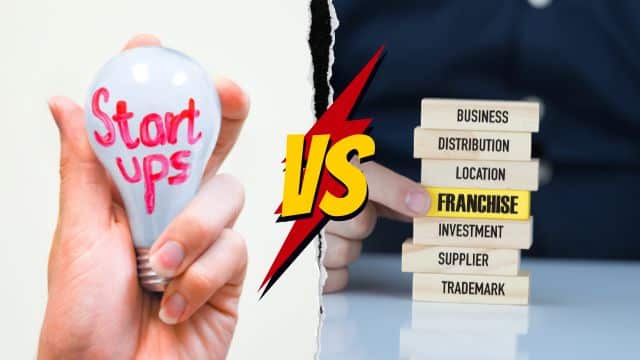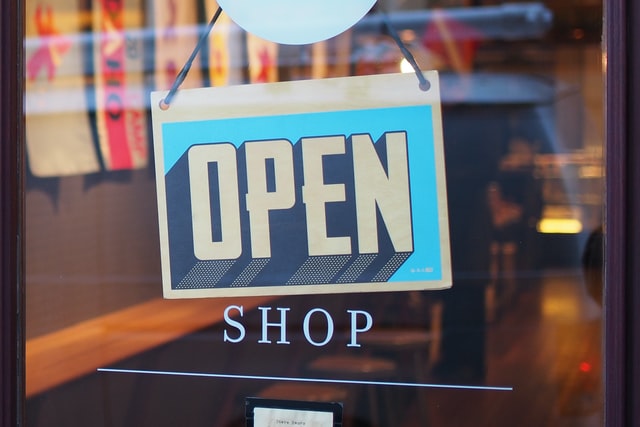Many first-time entrepreneurs have confusion about whether to start a business from scratch or buy a franchise. The attraction of being your own boss with one purchase can be tempting, but there are some advantages to starting your own business versus buying a franchise that everyone must consider. Celebrated Astro Strategist cum Business Astrologer Hirav Shah shares his views on the pros and cons of both avenues.
Startups and franchise businesses are two distinct approaches to entrepreneurship, each with its own set of advantages, challenges, and characteristics. Here’s a comparison of the two:
Table of Contents
Is it better to own a Franchise or your own Business?
When you decide that you want to run your own business but you are confused about whether you should buy a franchise or launch a startup from scratch.
Recently Eminent Business Astrologer cum Astro Strategist Hirav Shah shared his thoughts on this issue. According to Shah, “It’s a huge life-changing decision to choose business as your career. One way is to start your own business or buy an existing one. Another way is to go for the franchising model and buy into a proven system with a known brand name. Each path has its own benefits, as well as its perils. Once the choice is made, the question is now what type of business to choose.”
Hirav Shah adds, “Weighing costs of franchising and benefits against those of a traditional non-franchised business should begin with a self-assessment. Are you able to follow a prescribed system, or do you need the freedom to experiment and innovate? Do you need total independence in every aspect, or can you remain loyal to a ready-made system 100%?”
Hirav Shah explains that if you measure it by ‘cost/profit’ scenario there is a price to pay for launching your own business. But there also is a price to pay in spending on a franchise system.
He says that to create an overview of the pros and cons of each option can help you decide which one is right for your personality and situation.
Starting a Franchise Business : The Pros
Franchising provides an opportunity, at its best, to buy into an existing, proven business model that comes with a proven track record, a successful training program, a solid supply chain, and expert technical support. Some of the best-known franchises have impressive success rates, with the chances of failure hovering in the low single digits. By purchasing a franchise, you get a turnkey business that is ready and waiting for you to take the reins. If you are detail-oriented, good at following directions, and comfortable with established systems, franchising provides a quick and easy way to become a business owner.
Depending on the franchise you select, you may have the choice of either purchasing a fully operational location or starting from the ground up at a new location. The former option enables you to step right in and take over a business that has an existing customer base, documented cash flows, and a workforce already in place. Franchising also provides a clear exit plan. When you are ready to retire, you can sell an existing, well-known business to another would-be franchise owner. Do you like to build a business or do you prefer to get started with a fully-operational business on day one? Either way, franchising would be an option for you.
KEY TAKEAWAYS of starting a franchise business
When it comes to starting a business, there are pros and cons to choosing to franchise or start your own venture.
Franchise owners benefit from being part of a larger, successful company that has already paved a successful path that will generate profits. While having a steady paycheck is enough for some people, being tied to a bigger organization can also be challenging.
Individuals who believe they can build a better mousetrap and want the freedom of entrepreneurship may be better off starting their own startup.
Starting a Franchise Business : The Cons
Franchising also poses challenges. Purchasing a franchise can be an expensive proposition, with costs often running as high as $500,000 to $1 million. Franchises also come with ongoing expenses that reduce your take-home pay. There are fees that must be paid to the home office on an ongoing basis, mandates (such as remodeling at a hotel or price reductions for a promotion at a restaurant) that eat into profits, and supplies that often must be purchased at inflated prices.
While general statistics cite franchise failure rates at an average of anywhere from 15% to 35%, even those statistics can be a bit misleading. Some franchises fail at a rate of just 1% (arguably giving you a 99% chance of success), while others crash and burn at a rate of more than 40%. Clearly, not all franchises are created equal, so you need to look carefully before you take the leap. It’s also important to keep in mind that purchasing a franchise is like buying a blueprint for success; like all blueprints, it only works if you follow it.
Corporate-level scandals, actions, and mishaps can also have negative effects. Consider how the owners of Chick-fil-A franchises had to deal with protests and backlash when the firm’s CEO made comments about same-sex marriage or how Subway franchise owners felt when the FBI charged long-time Subway pitchman Jared Fogle with distributing and receiving child pornography. If you dislike having your livelihood tied to somebody else’s image, you may want to steer clear of franchises. Ultimately, the franchise owner runs the business but the home office is the boss. If that sounds too constraining for your style, you might be better off starting your own business.
Starting a Startup Business : The Pros
If you’ve got an idea, you may be able to turn it into a business. Sam Walton did it with Walmart, Bill Gates did it with Microsoft, John Schnatter did it with Papa John’s, and countless other entrepreneurs have done the same. With startup costs that could be as low as $10,000, having your own business – whether full-time or part-time, in your basement, your garage, or even out of the trunk of your car – is significantly less expensive than the costs associated with many franchises. And if all goes well, your unique idea may become a franchise one day! If you dream big and want a shot at the big leagues more than you want a steady paycheck, launching your own business may be the right move for your personality.
Most important for many budding entrepreneurs, building your own business makes you the boss in every way possible. That is the beauty of being self-employed. You make every decision. You set your schedule. You run the show exactly the way you want to run it. Nobody can tell you what to do because you own the business. If you know how to build a better mousetrap or run a better business, this is your chance to prove it to yourself and to the world.
Starting a Startup Business : The Cons
When you start your own business, you are on your own. Much is unknown – will the product sell? Will customers like it? Will you make enough money to survive? The failure rate is also high. Statistics show that 20% of startup businesses don’t survive the first year; about half make it to year five; and approximately 35% last ten years. If your business is going to survive, you alone will have to make that happen. To turn your dream into a reality, you can expect to work long, hard hours with no support or expert training. If you try this on your own without any experience, the deck is stacked against you. If this sounds like too big a burden to bear, the franchise route may be a wiser choice.
For a closer look at the challenges you will face, compare a mom and pop hotel to a nationally known chain. Among the tools available to a chain (that you won’t have with your own small operation) is the beautiful facade on the building, the pre-planned maintenance upgrades that keep the lobby and rooms looking good, the housekeeping system that maintains the rooms’ cleanliness, and the state-of-the-art revenue management software at the front desk. The same comparisons can be done with restaurants, auto-repair facilities, copy shops, and many other businesses. If, on the other hand, looking at the competition leaves you convinced that you can do it on your own, it’s time for you to get started!
Final Word
To summarize, as Hirav Shah puts it, your decision between starting a new business (a startup) and becoming a franchisee hinges on your entrepreneurial objectives, how comfortable you are with taking risks, and your personal preferences
1. Ownership and Control:
Startup: In a startup, you have complete control over the business. You create the brand, product, or service from scratch, and you have the freedom to shape the company as you see fit.
Franchisee: In a franchise, you are essentially buying the rights to operate an established business under an existing brand. While you have some control over day-to-day operations, you must adhere to the franchisor’s established guidelines and business model.
2. Brand Recognition:
Startup: Startups often begin with little to no brand recognition, which means you need to invest time and effort in building your brand and customer base from the ground up.
Franchisee: Franchise businesses come with built-in brand recognition. Customers are often already familiar with the brand, which can make it easier to attract and retain customers.
3. Business Model:
Startup: Startups require the development of a unique business model. You need to validate your product or service in the market, which can involve a higher degree of risk and uncertainty.
Franchisee: Franchise businesses operate based on a proven and standardized business model. The franchisor has already established successful operations and processes, reducing some of the uncertainties associated with startups.
4. Investment and Funding:
Startup: Startups typically require you to secure your own funding, whether through personal savings, loans, or investors. Funding can be more challenging to obtain, especially for unproven concepts.
Franchisee: Franchise businesses often have a clearer picture of the initial investment required, as franchisors provide specific guidelines. Funding may be more accessible for franchises due to the established track record of the brand.
5. Innovation:
Startup: Startups are known for their innovation and the ability to disrupt industries with new ideas and technologies.
Franchisee: Franchises are generally more focused on replicating a successful business model than on groundbreaking innovation.
6. Risk and Reward:
Startup: Startups carry a higher level of risk because they are unproven in the market. However, if successful, the rewards can be substantial, and you have full ownership.
Franchisee: Franchise businesses have a lower risk profile because they operate under a proven system. However, the potential for high profits may be limited by the fees and royalties paid to the franchisor.
7. Flexibility:
Startup: Startups offer greater flexibility in terms of business decisions, but they also require a high degree of adaptability to pivot and change direction as needed.
Franchisee: Franchise businesses have less flexibility because they must adhere to the franchisor’s rules and standards. However, this can provide a level of guidance and structure.
Hirav Shah concludes by saying, “Woke entrepreneurs buy a franchise because the model works. It offers them a tested, stable model for running a fruitful business. It also requires them to operate on someone else’s model of business. For those with a big idea and a great understanding of how to run a business, setting your own startup presents an opportunity for personal and financial freedom. Only you can make a choice in deciding which model is right for you.“






























